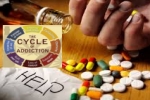When addiction grips a colleague, worries about stigma may lead them to try to hide their symptoms. Claire Rimmer, the Lead Addictions Therapist at The Priory Hospital, Altrincham explains the sensitivities surrounding addiction and mental health.

What is addiction?
Addiction is a mental health condition that results when an act or substance is used to the extent that it interferes with everyday life. Anyone can fall into addiction, though “people so often talk about high levels of stress in the workplace” acting as a trigger says Claire. “Because they are struggling to cope, they can turn towards substance abuse behaviour.” Claire adds: “although addiction can affect anybody, a lot of people with addiction problems are often successful in other areas of their lives, so this may reflect their type of employment e.g. those with high levels of responsibility such as senior management”.
Addiction at work
Addiction can be devastating, potentially resulting in failed relationships, money problems and emotional instability. At work, addiction may lead to decreased productivity, low attendance, and consequently high costs for a business. The CIPD found that almost a third of organisations have dismissed employees, where an alcohol addiction has been at least a significant factor. Though alcohol abuse is just one of many possible addictions, this suggests that supporting those with a possible addiction is both a business and personnel necessity.
How to spot addiction at work
Symptoms of addiction will differ based on the substance or act, but you may notice the following signs:
- Changes in work attendance or performance
- Mood swings, with temper outbursts
- Withdrawal from responsibility
- A defensive attitude
- Frequent small accidents or mistakes
- Paranoia or overreaction to criticism
- Secretive or dishonest behaviour
- Distraction
- Sudden weight loss
- Lack of concern over appearance
- Tiredness
These symptoms will vary in severity, but if you find that an employee or colleague is displaying some of them, you may want to consider the next steps.
How to help
To begin with, businesses should have policies in place to ensure staff are as safe and supported as possible when dealing with, or talking about addiction. The following steps may help you to raise the topic sensitively:
- Bring up your concerns in person and in private
- Speak in a friendly way, without judgment or accusation
- Avoid mentions of feelings – stick to facts instead
- Mention specific instances or events, rather than general, vague attitudes
- Be solution-focused and positive in the way you address the next steps
Bring up your concerns in person and in private
To find out more, it is best advised to speak to a specialist. “Just coming along and having a chat is the first step in addressing the problem” says Claire, “It doesn’t matter where the person is at with the addiction”.
“Mental health conditions need to be taken seriously and treated with openness and respect in the workplace. With the right support people can make a full recovery.”
If you’d like to learn more about addiction, read the dedicated page on www.priorygroup.com
Latest blog posts
- Is There a Santa Clause?
06 / 12 / 2023
- Lend Us a Hand!
22 / 11 / 2023
- What Happens When There is a Clash in Protected Characteristics?
17 / 10 / 2023
- Encouraging a Healthy Workforce 2
21 / 09 / 2023
- Encouraging a Healthy Workforce
23 / 08 / 2023
- What a Disaster - (But We Have a Cunning Plan!)
20 / 07 / 2023
- It’s Time We Stiffened the Sinews
14 / 06 / 2023
- Why Is It So Important to Develop Emotional Resilience?
16 / 05 / 2023
- When is a discretionary bonus not discretionary?
20 / 04 / 2023
- Recovering Training Costs 15 / 03 / 2023
